- Home
- Conn Iggulden
Fig Tree
Fig Tree Read online
FIG TREE
Conn Iggulden
Copyright
Published by HarperCollinsPublishers Ltd
1 London Bridge Street
London SE1 9GF
www.harpercollins.co.uk
First published by HarperCollinsPublishers 2013
Copyright © Conn Iggulden 2013
Conn Iggulden asserts the moral right to be identified as the author of this work
A catalogue record for this book is available from the British Library
This novel is entirely a work of fiction. The names, characters and incidents portrayed in it are the work of the author’s imagination. Any resemblance to actual persons, living or dead, events or localities is entirely coincidental.
All rights reserved under International and Pan-American Copyright Conventions. By payment of the required fees, you have been granted the non-exclusive, non-transferable right to access and read the text of this e-book on-screen. No part of this text may be reproduced, transmitted, down-loaded, decompiled, reverse engineered, or stored in or introduced into any information storage and retrieval system, in any form or by any means, whether electronic or mechanical, now known or hereinafter invented, without the express written permission of HarperCollins.
Source ISBN: 9780007285440
Ebook Edition © 2014 ISBN: 9780007584000
Version 2017-05-20
Table of Contents
Title Page
Copyright
Chapter One
Chapter Two
Chapter Three
About the Author
Also by Conn Iggulden
About the Publisher
CHAPTER ONE
Augustus Caesar sat in the shade, a precious commodity during a summer on Capri. He was leaning back and comfortable, propped up on fine cushions with his legs stretched out in front of him. For a time, he closed his eyes and just let the heat seep into him, easing old aches.
The grand palace he had built on the hill’s peak had no water of its own, so that it had to be brought up by cart and donkey to fill the cool rock cisterns. The sun beat down on his legs, though his upper body was shielded from it by the patterned shadows of the old fig tree. He looked up at the thought, pleased at how the living thing had thrived in such rocky soil. Like the palace itself, the tree had fought for its place and even borne fruit, surviving only because of will. The green figs were ripening and would soon be sweet, one of the few things Octavian still enjoyed. Rocks and dust and sun had not prevented him building on the highest point of the island, with a view unmatched anywhere in Roman lands. The sea was very blue, sparkling a mile or more below his feet.
When his wife came out to check on him, the old man was briefly surprised at the changes the years had made in her – and in him. Such moments could strike him without warning, betraying his belief that he was essentially unchanged. He would see Livia’s white hair, or catch a glimpse of himself in a polished bronze mirror and be astonished. He was seventy-seven years old; Livia seventy-one. They had been married for almost half a century, but the mind was a strange thing. As often as the sight of age depressed him, he could be reminded in an instant of Livia when she was young and beautiful. In the shade of the tree, as she raised a hand to her eyes to look up at him, she could have been the same woman he’d married fifty years before.
‘What makes you smile so?’ she said, her expression mild.
‘I was remembering how you looked when I saw you first,’ he replied. ‘I tell you I never loved till that moment.’
Livia snorted softly, though her gaze was affectionate.
‘So you have said before. I blush to think of it, still. To approach a married woman in such a way, with such demands and offers! You were shameless then.’
‘I still am,’ he said, delighted with the memory. He had been so very young, so very certain of himself. Yet he had been right and Livia was still the great love of his life. ‘Well, a few years have passed since then, Livia. Have I not proven my devotion to you? Or will you tire of me now and take other lovers?’
She laughed at the idea, reaching back to curl a wisp of perfectly white hair over her ear. She had dyed it dark for years, but let it grow out as she turned seventy. Her old beauty had gone, as such things will, but he saw her youth still in her eyes.
‘Perhaps I will, at that,’ she said. ‘There is a young guard here who watches me with great interest.’ She came over to where he sat, easing herself down with a care that belied her words so that she could lean over him and become part of the shadows casting shade on her husband. He looked up at her and reached out to touch her face. Both of them felt his hand shake as he brushed her cheek.
‘Will you come down with me, to the ship?’ he asked. He saw her bite her lip in an expression he knew as well as his own. ‘What? What is it?’
‘I do not like this, Octavian, all these plans. It’s as bad as the committee you set up, always talking of your death, as if you are already gone.’
He struggled to sit up on the couch, irritated as always that his body had become so weak. It was not that he remembered his youth – it was too far off, like some distant horizon of old memories, another land completely. Yet he remembered being fifty and being sixty. Those days were not too far back and he thought he had been strong then, still vital. Somehow, it had drained from him with every passing year, with sore joints and withering muscles in his arms and legs until they became painfully thin and he could no longer look at them with anything less than revulsion. He was all bones as he lay there and he knew Livia saw it as well.
‘My hands shake, Livia. My heart shudders in my chest and each morning, until the slaves rub me down, my legs and back are so stiff I can hardly move at all. It cannot be long now and I will not let Rome be broken apart by young fools, not again. By the Gods, I should know! I was the young fool, once, so sure I held the destiny of Rome in my hands.’
‘But you did, Octavian.’
He made a hard sound in his throat.
‘Yes, well, fortune smiled on me then. Perhaps fortune needs a nudge from me now, as my last service. I will see Marcus once more, Livia.’
‘You are so certain he could be your heir?’ she asked, her voice hardening subtly. He heard the echo of old anger and old arguments and yet he did not look away.
‘Please. We have talked this to death, Livia. There is no more to be said that has not been said a thousand times already. My grandson is of my blood. Whatever that is worth, it is enough for me to see him once more before I make my final decision.’
Livia closed her eyes for an instant, struggling with the desire to argue with her husband. Ten years before, the issue had been settled, at least to her satisfaction. Her son Tiberius from her first marriage had been formally adopted by Octavian. The emperor had begun to share more and more power with Tiberius, preparing him to take over. Yet there had never been any love for him in her husband. Octavian had approached the task of training Tiberius as mere duty, without affection or liking.
Her eldest son was by then fifty-five years old, a man of dignity and great honour who had bided his time and prepared to be emperor for a decade. There had never been the slightest hint of disloyalty from him. Yet as the years passed, Livia had seen her husband follow his grandson’s progress with an interest he’d never shown in Tiberius. Marcus Postumus may have been the son of Octavian’s only daughter, but he was not half the man Tiberius was.
It was not just a mother’s love, she reminded herself. At twenty-four, Marcus was rarely out of trouble and scandals followed him at every turn. He’d lived a life of great wealth, spoiled and made rotten by the fortunes at his disposal and the imperial connections to save him from every failed business and outraged accusation. Livia pursed her lips tight rather than
rake up cold ashes once again.
Octavian was blind to all his grandson’s weaknesses of character, persevering in his praise of the young idiot, while Tiberius laboured in vain to please him. When she did speak at last, Livia chose her words carefully, accepting that Octavian would not be turned from his course.
‘I understand you must see him. I only ask that you see him clearly, my love. When you meet Marcus, he will be a prisoner still, accused in the assault on a woman and the death of one of his drunken friends.’
‘All unproven,’ Octavian snapped. He wanted to bite back his reply, but the words had been spoken. It was as if he and his wife rehearsed lines from a play and could not alter the script as it played out. He could sense his wife’s irritation growing.
‘Unproven because two witnesses have vanished!’ she said. ‘Disappeared into the air! My husband, in this one thing, your judgement is … not sound. He may have your blood in him, but he is not the man you were. Not the man you are.’
Octavian sat up further, wincing as the glare of the sun reached his face. He used the wooden arm of the couch to lever himself to his feet, grunting as his bones creaked. His face flushed with the effort and his bowels groaned, aching with a weakness he hated. His body was failing him after almost eight decades and he was both weary and angry at himself. He took a deep breath rather than snap again at his wife, though they seemed to spend more and more of each day bickering.
‘I will see him, Livia. I have made Marcus no promises and I will not, if I judge him unfit for Rome. Yet he is young still! Barely twenty-four! He is not the boy who tied burning brush to foxes and let them run through the crops. Not yet the man he will be! A few years can change a young man completely – before the will and the mind set in ruts for the rest of his life.’ He saw the pain he was causing her and his voice softened. Part of him was aware that he relented too easily, too quickly, but he loved her and it took an effort of will to remain angry.
‘If I see he is not the man I was at his age, if I judge him as wanting, that will be the end of it. Tiberius will be emperor after me. He is a good man, I know it. A little dull and worthy, perhaps, but a solid hand for Rome.’
Livia raised her eyes in exasperation.
‘You cannot resist the little barbs, can you? Dull and worthy? Better that than cruel and dishonest.’
‘I’m sorry, my love. That was unfair. You did not say if you were coming with me, to the island.’
‘To the prison, Octavian, where he is guarded day and night. No, I will remain here. I will wait for you to come back and tell me what wonderful news you have, that your grandson is so much changed from the idle wastrel he was the last time. I will wait for you to tell me Tiberius will not be emperor and your precious committee has ordained Marcus Postumus as your heir.’
Livia rose from the couch and walked stiffly away from him, heading back into the vast complex of buildings he had built on the hill, an oasis of Rome in the dry crags all around. Octavian scratched irritably at the white stubble on his cheeks.
‘I will still see him,’ he muttered to himself. He looked over to where soldiers waited with a carriage and awning to shade the emperor from the midday sun. A ship waited in the bay below to take him to the tiny island of Planasia, south of Elba, where the only man who carried the emperor’s blood in his veins was still held prisoner. Raising his head, Octavian gathered his toga around him and walked slowly, accepting the strong arm of a centurion to help him climb up.
Octavian had not expected the journey along the west coast of Italy to invigorate him. In the past, he had been a poor sailor and he’d dreaded the effect of the waves on his already weak stomach and bowels. Yet the captains of the three galleys had gone out of their way to make the trip as smooth as possible, with two of them positioning themselves around the central trireme to shelter the emperor from wind and the heaving motion of the sea. As if the gods blessed the enterprise, it had been a clear run, without a sign of bad weather. Octavian had spent twelve days simply resting on the deck, standing for hours until the pain in his lower back grew too fierce and he would order couches brought up for him to rest. He had expected to spend the time thinking of what lay ahead, of the succession to come and the best man to inherit Rome from his hand.
Yet he had ruled that coast for decades and there were sights and memories there from a lifetime, calling his attention away from his own worries and plunging him back to the distant past and the trials of his youth. It was part of growing old, he knew, that the past had such a call on him. Perhaps it was because there was so much of it and so little ahead. His spirit was anchored in decades long gone.
From the deck of the galley, he had caught a glimpse of the canal dug by his friend Agrippa, dead for more than twenty years. That tiny gap in the coast had silted up long before, leaving just a crease in the land where it led back to a deep lake. Yet he knew it was there and his thoughts were on his youthful friends as he passed by.
Agrippa had come surging out to do battle at sea, born from the womb of the land to protect Octavian from the fleet of Sextus Pompey. Octavian blessed Agrippa’s memory. In a brazier on deck, he burned sweet incense for a good man, still missed. He had outlived so many of those he had called friends – and enemies. Yet there was no mistaking the signs of death on him, at last. His hands shook all the time and there was always pain somewhere, sharp or dull, but always present. Octavian was determined only to live long enough to choose his heir wisely, his last task in the world.
He set his jaw as his galleys pushed on, west of Rome, where the Tiber emptied to the sea and the port of Ostia bustled. Octavian did not allow a stop there, knowing only too well that there would be messages and work waiting for him. In the city herself, there were law cases still waiting on his ruling. He put them all from his mind, concentrating on the young grandson he would see and judge. Octavian wiped sweat from his eyes, blinking against an old sting as he flicked dark droplets onto the deck and watched them sink into the bone-dry wood. He had not shared everything he knew with Livia. If he had told her the latest whispers that had reached him, it would have led to another furious argument. He was too old to view such marital discord with anything but weariness.
As well as the current charges laid against Marcus, Octavian had been told the young man was involved in a plot to seize power. If the rumours were accurate, young Marcus planned for his grandfather to meet a quiet and sudden end. It seemed his grandson was supported by a good sized faction in the senate. Octavian smiled to himself, knowing he had the names of every man involved on a list in his sea-chest. Fifty years experience as an emperor made their deals and whispers little more dangerous than the squabbling of children. He had seen too many plots to even remember them all – and torn them all out, root and branch. That was what Livia would not understand, if he’d told her. Octavian didn’t care if there were plots. If anything, such energy and determination would be welcome in Marcus. By the gods, at least it would show him his grandson wanted Rome!
Octavian glowered at the coast drifting past him, land gold and green with water the colour of lapis lazuli passing under the keel. Tiberius would not be plotting against him, he thought scornfully. Good, honest Tiberius would wait patiently for what he had earned. Livia’s son was without doubt the clear choice a man of nearly eighty might make to succeed him. The trouble was that Octavian still remembered his youth. He had been a different man then, one willing to hunt his enemies to the ends of the earth and take his vengeance. Octavian suspected Tiberius would have bored that younger self to madness.
Through his vast network of informants and clients, Octavian had spread word that he would be taking a holiday in a house south of Rome. He told no one of his true destination, beyond Livia herself. Even the three galley captains were informed on route, just before they would have headed into Ostia and the imperial berths. The senators planning to wrench power from Octavian’s hands would have lost track of him for a vital few weeks, lulled at the thought of the old man resting in
a fine villa. Octavian clenched his hands on the galley rail, looking down with surprise at the pain in his knuckles as he did so. He hated being old, but he would finish this last thing. Closing his eyes against the sun, he sent a silent prayer to the spirit of Julius Caesar, that the bloodline would have run true, like unto a thread of gold in clay.
Octavian knew Livia already suspected the truth, but he saw no shame in it. He was first in Rome, the Princeps of the greatest city in the world. Who came after him was his decision, alone. If Marcus showed him any sign of Roman dignity, Octavian knew he would have Tiberius quietly killed and his grandson handed the reins of empire. Octavian owed Rome everything he was, he knew that much. He would make the best choice for his city, whether it cost him his marriage or his peace, or his remaining days.
When the galleys reached the channel between the coast and the isle of Ischia, Octavian knew they were no more than a day from the fortress and prison of Planasia itself. Marcus Postumus had been there for almost three months. It had been time enough for the young man to think over his wild life and to consider the best use of his talents.
Octavian went to his cabin early, though he knew he would be lucky to sleep as the galleys anchored in the lee of Ischia and began to bob in the sickening rhythms of the swell. Some men found it soothing, but Octavian’s roiling stomach meant he had to keep a bucket by his bed.
He tossed and turned as night fell, sweating into his blankets and finally losing his patience at around midnight, with the moon high and clear against the stars. In a foul mood, Octavian called for his slaves to wash and dress him in clean robes, then came out onto the deck, breathing deeply in the warm air. With a single order from him, the watch officers set to rousing the crews in the darkness.
Not a whisper of complaint was heard, despite the hour. Octavian’s word was as law and the Roman soldiers raised the anchors quickly, in unison. In the holds below the main deck, rowers were woken and given water. They set their hands on immense oars that they knew as well as their own skins, shoving the lengths of wood across their thighs until they hung above the waves, then lowering them down into the black sea. They waited for the order and the day’s labour to begin, easing aching muscles, blinking at each other in the darkness and accepting handfuls of dried meat and fruit to sustain them.
-->

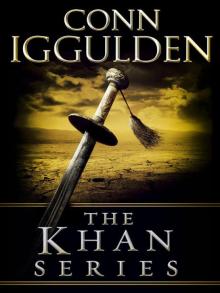 The Khan Series 5-Book Bundle
The Khan Series 5-Book Bundle Tollins 2: Dynamite Tales
Tollins 2: Dynamite Tales Tollins: Explosive Tales for Children
Tollins: Explosive Tales for Children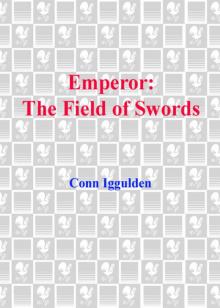 The Field of Swords
The Field of Swords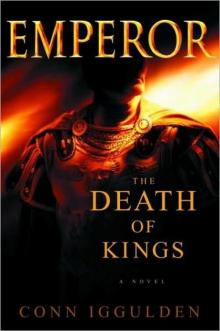 The Death of Kings
The Death of Kings Quantum of Tweed: The Man With the Nissan Micra
Quantum of Tweed: The Man With the Nissan Micra Bones of the Hills
Bones of the Hills Genghis: Birth of an Empire
Genghis: Birth of an Empire The Gates of Rome
The Gates of Rome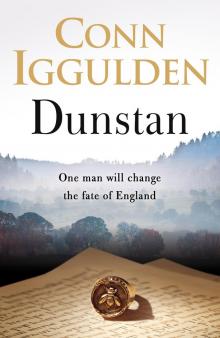 Dunstan
Dunstan Fig Tree
Fig Tree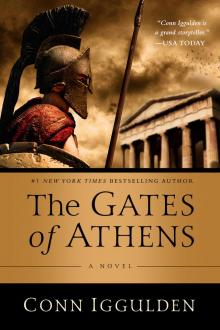 The Gates of Athens
The Gates of Athens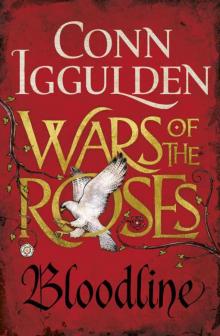 Stormbird
Stormbird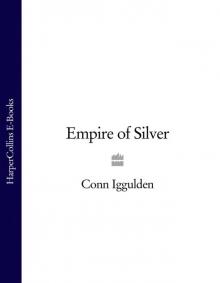 Khan: Empire of Silver
Khan: Empire of Silver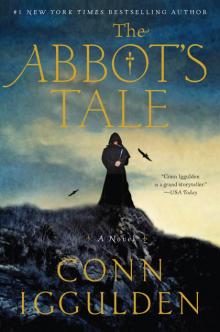 The Abbot's Tale
The Abbot's Tale Gengis: Lords of the Bow
Gengis: Lords of the Bow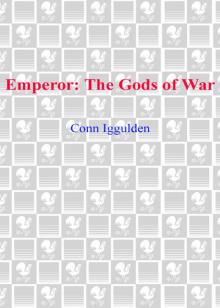 The Gods of War
The Gods of War Blackwater
Blackwater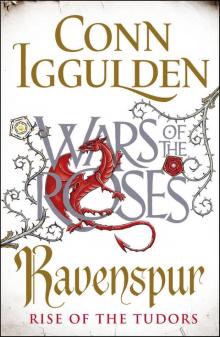 Ravenspur: Rise of the Tudors
Ravenspur: Rise of the Tudors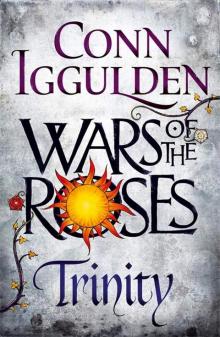 Wars of the Roses: Trinity (War of the Roses Book 2)
Wars of the Roses: Trinity (War of the Roses Book 2) The Gods of war e-4
The Gods of war e-4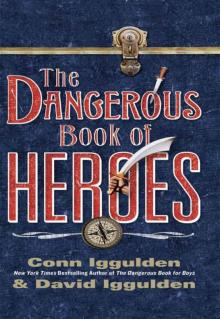 The Dangerous Book of Heroes
The Dangerous Book of Heroes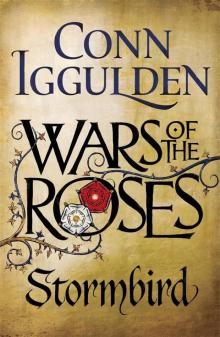 Stormbird wotr-1
Stormbird wotr-1 Emperor: The Death of Kings
Emperor: The Death of Kings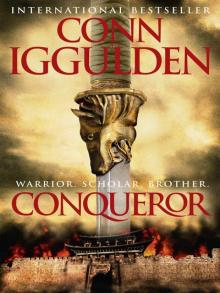 Conqueror (2011) c-5
Conqueror (2011) c-5 The Dangerous Book for Boys
The Dangerous Book for Boys Genghis Lords of the Bow
Genghis Lords of the Bow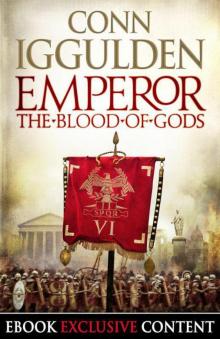 Emperor: The Blood of Gods (Special Edition) (Emperor Series, Book 5)
Emperor: The Blood of Gods (Special Edition) (Emperor Series, Book 5) The Emperor Series: Books 1-5
The Emperor Series: Books 1-5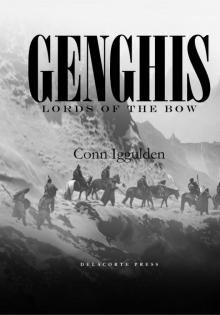 Lords of the Bow c-2
Lords of the Bow c-2 Lords of the Bow
Lords of the Bow Quantum of Tweed
Quantum of Tweed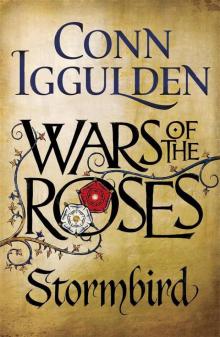 Wars of the Roses 01 - Stormbird
Wars of the Roses 01 - Stormbird Empire of Silver c-4
Empire of Silver c-4 Birth of an Empire
Birth of an Empire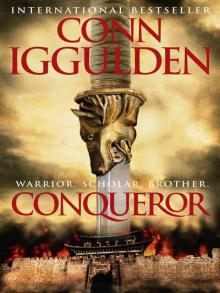 Conqueror (2011)
Conqueror (2011)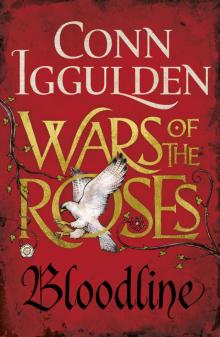 Wars of the Roses: Bloodline: Book 3 (The Wars of the Roses)
Wars of the Roses: Bloodline: Book 3 (The Wars of the Roses) Bones Of the Hills c-3
Bones Of the Hills c-3 Empire of Silver
Empire of Silver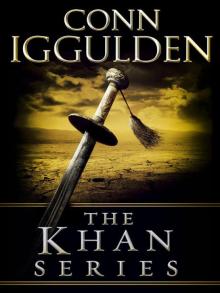 The Khan Series 5-Book Bundle: Genghis: Birth of an Empire, Genghis: Bones of the Hills, Genghis: Lords of the Bow, Khan: Empire of Silver, Conqueror
The Khan Series 5-Book Bundle: Genghis: Birth of an Empire, Genghis: Bones of the Hills, Genghis: Lords of the Bow, Khan: Empire of Silver, Conqueror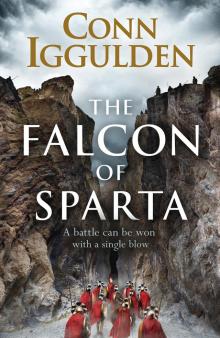 The Falcon of Sparta
The Falcon of Sparta Explosive Tales for Children
Explosive Tales for Children